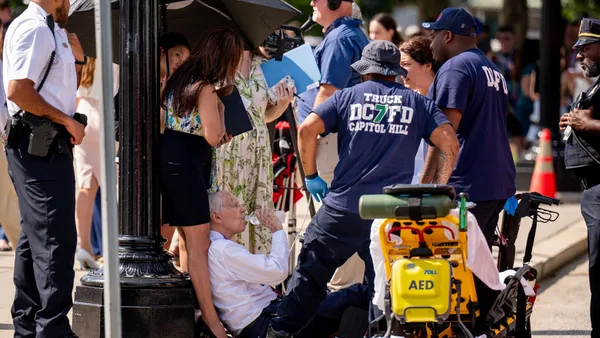Dive Brief:
- The Toyota Mobility Foundation announced the five finalists of its three-year, $4 million Mobility Unlimited Challenge.
- The goal of the challenge is to improve the lives of people with lower-limb paralysis. The five finalists chosen from 80 entries are:
- The Evowalk: Evolution Devices (United States), a non-intrusive sensor sleeve that stimulates leg muscles and tracks the user's walking motion
- Moby: Italdesign (Italy), a network of powered, wheeled devices for manual wheelchair users that is accessible via an app
- Phoenix Ai Ultralight Wheelchair: Phoenix Instinct (United Kingdom), an ultra-lightweight, self-balancing, intelligent wheelchair
- Qolo (Quality of Life with Locomotion): Team Qolo, University of Tsukuba (Japan), a mobile exoskeleton on wheels
- Quix: IHMC & MYOLYN (United States), a powered exoskeleton
- Each of the five finalists will receive a $500,000 grant to further develop their concept. The winner will be announced in 2020 and will receive $1 million.
Dive Insight:
In addition to the money, finalists also receive assistance with launching their ideas. They will attend workshops, receive mentoring from engineering experts and collaborate with end users. The Mobility Unlimited Challenge will reach out to people with lower-limb paralysis to get their input on the entries and help shape the mobility solutions.
Toyota is most commonly known for its car manufacturing, but the Toyota Mobility Foundation was established in 2014 to develop different types of ideas to help people get around. The foundation focuses on equitable mobility ideas, especially for individuals who have fewer resources at their disposal. The foundation also puts an emphasis on finding solutions that are economically and environmentally sustainable.
The goal of the Mobility Unlimited Challenge is to provide innovative options for individuals who have physical barriers to getting around. The teams are working on comfortable, easy-to-use devices that boost mobility and independence for millions of people around the world. The concepts have the potential to expand into other areas and help individuals experiencing other types of mobility barriers.
“These five finalists have shown real innovation driven by human-centered design. We think that the technology incorporated in these devices could change the lives of a huge number of people around the world, not just for people with lower-limb paralysis, but also those with a wider range of mobility needs," Ryan Klem, Director of Programs for Toyota Mobility Foundation, said in a statement.











